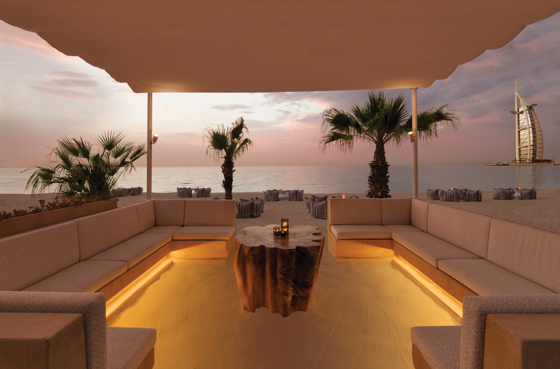José Silva and Michael Ellis could easily form a mutual admiration society, rooted in a respect for each other and a shared enthusiasm for sublime food and wine.
The new-ish CEO of the Jumeirah Group tapped the global director of Michelin Guide to become the luxury hotel operator’s very first chief culinary officer. Silva said he absolutely created the position with Ellis in mind.
“What is the message to say to the world that food really is going to be (the) single most important differentiation to my brand?” Silva told HOTELS in early July. “And I thought automatically, it means elevating the position of chief culinary officer with chief talent officer or chief financial officer. I called him and offered him the job without describing it.”
Ellis says he wasn’t looking to leave Michelin, where he’s expanded the guides’ global footprint into several new markets across the globe. “I knew José Silva from his days at the Four Seasons, and he’s one of the most astute and visionary F&B operators in the luxury hotel sphere. So, when José initially contacted me to discuss the possibility of joining Jumeirah, that got my attention.”
Ellis naturally asked Silva what being a chief culinary officer would entail. “I said it means you are equal to the finance officer, and you can tell him to buzz off,” Silva said.

The two first met when Silva was transforming the George V into the first luxury hotel in Europe with three Michelin-starred restaurants, and Ellis called Silva and asked him out for coffee. “We immediately connected. Not only our passion for food was there, but our understanding of what creates an extraordinary dining experience or a dish that will be engraved in your memory,” Silva said. “A dish you remember one month after you ate it is one star, six months is two stars, and year or forever is three stars.”
But a restaurant doesn’t need to adhere to Michelin’s stringent guidelines for stars to create unforgettable culinary experiences, nor even to be mentioned in a guide, Ellis pointed out. “Michelin’s become associated with fine dining, but only about 15% of the 20,000 restaurants in our guides have stars,” Ellis said. “We have street food, we have casual fine dining. Casual fine dining is one of the hottest trends going. Making simple products sublime is easy to say, but difficult to do, and that attracts people to restaurants around the world. That’s something we’re going to look at at Jumeirah.”
Ellis, who at the time of being interviewed was in the midst of international travels to launch three new Michelin Guides, will formally start his position this fall, and Silva said he will hit the ground running. “His first goal will be undertaking the design of nine new restaurants in Dubai in our beachfront offering, and we’re also working on something in London,” Silva said.
Not only will Ellis be working on expansion of the hotel group’s restaurants and re-vamping of current restaurants, but he will also be tapping into his experiences as a sommelier. “He has two passions not fully realized” at Michelin, Silva said. “One is his wine passion, and we’re going to create the Michael Ellis Wine List. The other one is social dining being more integrated into (F&B operations).”
After the wine list is launched, Ellis will be involved “in the coffee culture and the bakery culture of the brand,” Silva said, adding that he will also help design a health dining menu “with fantastic flavors.”

Destination dining, Silva said, is a priority, and Ellis understands what it means globally. “Destination dining is central to what people are talking about,” Silva said. “I can give you all the money in the world and not necessarily give you a destination restaurant. It’s the toughest thing to do because it’s artistic and highly complex, and every brand is trying to do that and not exactly succeeding.”
Ellis said the dining experience for him has always been focused on the food, and if the food was amazing, he’d enjoy the experience. But years of dining out with his French wife Virginie changed his views. “It has to be about the experience, overall,” Ellis said. “I’ve taken my wife to places where I think the food is fantastic, but she hasn’t liked it. We went to one place in the French Alps where the food was (absolutely) fantastic, two stars, but I felt I was having dinner at my grandmother’s house. It was fantastic, classic French food, but the décor was from the 1960s.”
Everything, from the lighting to the tables to the food, has to come together to create a unique experience – one that turns first-time customers into repeat clients. “What I’d like to see is a dining room with happy customers who come back,” Ellis said. “How (every) establishment does that, that’s their secret sauce.”
It will be Ellis’s job to develop such secret sauces for the brand’s individual restaurants. “I’ve had a unique bird’s eye view, to have my finger on the plus on different countries around the world,” Ellis added. “I’ve seen what concepts work. People are hungry and thirsty for new things, and I think one of the things I will (bring) to the Jumeirah Group is help them do best practices. I can say ‘Hey, I saw a great concept for whatever it might be, Neapolitan cuisine or Japanese food from (a certain region), and we can do something like it, and I know a chef who can do that.’”
Conversely, Ellis said, he also knows what doesn’t work – what concepts haven’t emerged as staying trends, what elements clash within a restaurant, and the basic cooking errors that can ruin a meal simply because “people are not paying attention.” “How many times have I been to a place and I’m lost because I don’t know what the chef is trying to say,” he said. “People are looking for an overall experience, but there are many, many different experiences out there.”
Successful hotel restaurants attract locals. “Working in the hotel business 15 years ago, locals did not go to hotel restaurants, and that paradigm has completely shifted,” Ellis said. “I think Jumeirah has an incredible ability to do that going forward.”
Ellis and Silva would welcome new Michelin stars to their joint ventures, but they both believe stars aren’t the only indication of a great restaurant. Chefs have frequently come to Ellis, asking him for advice on how to earn a star or additional stars at Michelin. “Sometimes a chef will say, ‘I don’t understand—my restaurant’s packed,’” Ellis said. “And I’ll say, ‘Well, dude, don’t change anything. You have it all figured out if your restaurant is packed with happy customers.’ Plenty of places are doing just fine without Michelin.”
Silva added that he doesn’t care if Jumeirah restaurants make it to three stars, but he does care that every chef has at least one or two of what he calls “cult dishes.” “They are dishes you will travel for… a dish that is a destination,” Silva said.
Yet, “food should not be intimidating,” Silva said. “If food is too refined, it lacks emotion. I’m a big believer in emotions. Emotion is triggered by food. Food to me is just like music. If you listen to music, it needs to vibe in your core. For food, you taste it, and it needs to vibe in your core.”
Silva believes Ellis understands this. “I know there’s an artistic side to him, and I don’t think he’s expressed it (as well at) Michelin,” Silva said. “I expect to see more of that in him.”
Still, having Michelin award the Jumeirah brand more accolades wouldn’t hurt. “I would welcome any recognition the Michelin Guide is willing to give,” Ellis said. “My objective will be to fill our customers with happy customers. A successful restaurant is what counts. If we do that well, Michelin will recognize that.”
